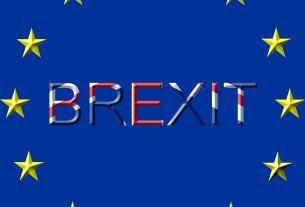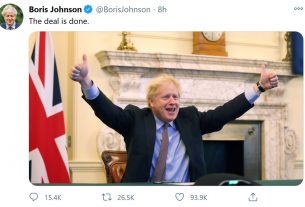The UK government has been warned that Northern Ireland is “one storm or boat breakdown away” from “a collapse of the NI supply chain”.
Michael Gove has received an 11-page report forecasting the grim scenario that could occur within five days without urgent action from ministers.
Cabinet office minister Gove said the post-Brexit trade chaos inside the UK between GB and NI “will get worse before it gets better”.
Shelves are emptying in shops across Northern Ireland and the Road Haulage Association said that “after just eight days of the Irish Sea border” there are major difficulties in getting products from GB to NI.
“The supply chain is collapsing and within a matter of a week may totally collapse,” stated the RHA in its report to the Cabinet Office, while Gove later insisted that “work is ongoing” which is “all part of the process of leaving the European Union”.
DUP calls for Brexit deal to be suspended
Gove’s comments have failed to reassure many and DUP MP Jim Shannon is demanding the government takes the “bull by the horns” and immediately suspends the Brexit agreement by invoking article 16 – put in place to stop businesses having to deal with extra bureaucracy caused by the UK’s land border with the EU in Ireland.
Shannon complained that shops are having problems with stock and bureaucracy which fishermen have also complained to him about.
“The Secretary of State told us that there was no border down the Irish sea but I will tell you there is a lot of bureaucracy and lots of problems,” Shannon told RT Question More, reported by the Express. The MP told of 100 boxes of fish taking eight hours to “complete the paperwork, complete the procedure and move forward” to cross the border from NI to the Republic.
Shannon said quick government action is needed to save businesses, such as invoking article 16, adding: “The Brexit minister Michael Gove and the Secretary of State and the Prime Minister have to take the bull by the horns.
“They have to ensure that the problems that we are having now don’t escalate to a stage that those businesses will not be able to operate.”
Gove said he is in talks with the Northern Ireland Executive at Stormont to ensure “that businesses in Northern Ireland can continue to have access to the rest of the UK market, and that Northern Ireland businesses can have the goods that they need on the shelves, that they have access to at the moment”.
He warned in late December of “bumpy moments” ahead for businesses and individuals affected by the bureaucracy and red-tape resulting from the deal.
City of London loses €6bn-a-day euro business
While the £660 billion agreement reached between the EU and UK in December ensured the continuance of tariff free trade, there remain lots of other areas to be resolved.
“Let’s not forget that for financial services this is a no-deal Brexit,” said a brokerage chief executive, quoted by the Financial Times. It reports the changes caused by Brexit as being the “most sweeping for the City of London since the Big Bang deregulation” 30 years ago that transformed it into “one of world’s financial capitals”.
The lack of a deal with the EU on financial services has had immediate consequences for London which has “lost €6bn euro-denominated daily trading to venues in Amsterdam and Paris” – equating to losing €30bn worth of business from Monday to Friday.
However, finance executives said the main impact of the change has been “the absence of work” for their London offices with one city boss, bemoaning the “zero prominence to financial services in the [trade] agreement”, commenting: “We can do China, Australia, New Zealand and Brazil, but as of Monday we can’t sell our research and execution services to France and Germany. Which seems crazy.”
Losing the daily €6bn trade in EU shares is seen as just “the first of what is likely to be a series of Brexit blows to the City”.
Return of Swiss trading to city
The return of trading in Swiss stocks is being seen as clear evidence the UK is pursuing opportunities elsewhere by diverging from EU standards and rules.
The EU “revoked its recognition of Swiss stock exchanges in 2019 in a dispute over stalled trade negotiations”, a decision which the UK upheld as a member nation of the EU.
That judgement in Brussels not only London the €1.2bn daily trade in Swiss stocks, but also the ability to trade Nestlé and Roche – “two of the five most actively traded shares in Europe last year.”
The UK and Switzerland have already agreed to strengthen their financial services links and legislation – “to rekindle reciprocal links” such as UK shares being traded in Zurich – will be introduced in parliament this week.




